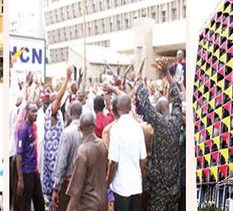Headlines
Discos increase the price of electricity covertly, and customers pay

Electricity distribution companies have raised the rates that people all over the country have to pay without telling anyone.
Despite the fact that the majority of discos kept this a secret, power users have protested the decision, calling it “a perfect heist” in light of the challenging economic conditions that exist in Nigeria right now.
Mr. Oye Sola, who lives in a prestigious estate in Lagos, said that he was sad about the price hike.
“The electricity tariff is now N72.2 per unit,” he declared. Another N66 price increase; I predict they will reach N100.an increased cost for subpar services.
Ikeja Disco patron Ola Busari quoted another as saying, “They are just milking us.” This burglary is flawless. Discos must be inspected.
Olojede, a different Lagos resident, claimed, “They raised prices without telling us.” We were not given any official notice as the executors of our estate. However, the Nigerian Electricity Regulatory Commission offers a 15-year price route for the Nigerian Electricity Supply Industry in its Multi-Year Tariff Order, with only a few minor reviews every year.
It says that every five years, important evaluations are done in which all of the inputs are looked at with the stakeholders and changes in a small number of criteria are taken into account. These criteria include inflation, interest rates, currency rates, and generation capacity.
The latest price increase, which a power distribution business attributed to NERC on Wednesday, was not, however, announced by the regulator.
Oyibo Ediri, a Twitter user, said that the Abuja Electricity Distribution Company had discreetly increased the cost in December by N12.65 for non-customers with maximum usage.
The price of power has been covertly raised by AEDC. The cost for tariff band A non-MD increased from N57.55 in December to N68.2. There has been no official word on the hike from @aedcelectricity or @NERCNG. “These individuals won’t stop trying to cheat us,” the tweeter claimed.
In response to the tweet, the AEDC explained on its official Twitter account, @aedcelectricity, that the price hike was based on a ruling from the NERC.
“Please be advised that the tariff hike is in accordance with NERC orders,” the disco said.
Additionally, in response to AEDC’s response, Ediri requested the power company disclose the most recent prices that the NERC had approved.
Please provide the current rates as requested by @NERCNG. “I’m grateful,” the Twitter user said.
Justin David, a different Twitter user, responded to Ediri’s plea by saying, “We await their response.”
READ ALSO: 2023: INEC orders polling places away from politicians’ residences, churches, and mosques
However, the disco made no additional remarks and did not respond to the power users’ inquiries.
As of Wednesday, the power regulator was unable to provide a response. Calls and texts requesting an explanation of the development received no immediate response from its representatives.
But according to NERC’s website, one of the commission’s main responsibilities under Section 32(d) of the Electric Power Sector Reform Act of 2005 is to make sure that the prices that licensees charge are reasonable for customers and sufficient to allow the licensees to finance their operations and make a profit that is reasonable for efficient operations.
The commission “established a methodology for determining electricity tariffs in the Nigerian Electricity Supply Industry and subsequently issued a tariff order called the Multi-Year Tariff Order that sets out tariffs for the generation, transmission, and distribution of electricity in Nigeria,” according to the statement. “This was done in accordance with the authority given under Section 76 of the EPSR Act 2005.”
“The MYTO’s goal is to set tariffs that reflect costs so that the power sector can be properly funded and run,” the report said.
It gives the NESI a 15-year tariff path, with small changes every year to account for changes in a small number of parameters (like inflation, interest rates, exchange rates, and generation capacity) and major changes every five years, when all of the inputs are reviewed with the stakeholders.
The tariff band A non-MD, which went from N57.55 per unit in December to N68.2 per unit, is where the tariff hike was first seen.
Uket Obonga, the National Secretary of the Nigeria Electricity Consumer Advocacy Network, reacted to the news by confirming the price hike but stressing that it was in accordance with the MYTO.
“They’re” (the discs) preparing for the new tariff regime, which takes effect in January, he said.I had almost 300 units in my metre on January 1 this year at around 4 p.m., but I needed to purchase some units online to verify whether there had been an increment.
“I bought units of N2,000, which according to the current MYTO should be about 26 or 27, but what I observed was about 21 units, which is confirmation that there is a tariff rise.
On January 1, a new tariff system went into effect. Outside of the MYTO regime, however, there have been other arbitrary increments. The one that went into force right away, nonetheless, is based on the MYTO as it is stated in the MYTO 2020 order.
Additionally, Sanusi Garba, the chairperson of NERC, had stated during a press conference that “we would alter the rate every six months to take care of the foreign exchange component of expenditures, as well as inflation.” Absolutely, this is a really simple matter.
The chairman said that the rate might not always mean a raise, but the naira kept losing value over time.
Godwin Idemudia, Ayeni Akinola, and Busolami Tunwase, respectively, the spokespeople for Eko Electricity, Ikeja Electric, and Ibadan DisCos, declined to comment on the situation. Our correspondent was pointed in the direction of the Association of Nigerian Electricity Distributors.
